Yasmina Reza’s God of Carnage is a gripping play about two couples meeting to discuss a playground incident, exploring civility’s collapse and primal instincts’ rise. Acclaimed for its sharp dialogue and dark humor, it reveals human nature’s raw truths.
Background of the Play
God of Carnage, originally titled Le Dieu du Carnage in French, premiered in Zurich in 2006 and later in Paris in 2008. Written by Yasmina Reza, the play gained international acclaim for its biting commentary on human behavior. It explores the breakdown of civility when two couples meet to discuss a playground altercation involving their sons. The play’s darkly comedic tone and intense dialogue reveal the primal instincts lurking beneath the surface of urban, middle-class life. Reza’s work captures the hypocrisy and societal expectations that often dictate human interactions, making it a powerful exploration of contemporary social dynamics. Its success led to translations into multiple languages and numerous stage productions worldwide, cementing its place as a modern theatrical masterpiece.
Plot Summary
God of Carnage follows two sets of parents—Véronique and Michel Houllié, and Annette and Alain Reille—who meet to discuss a playground fight between their sons. Initially, the conversation is civilized, but tensions rise, revealing underlying animosities and primal instincts. As the evening progresses, the parents’ polite facade crumbles, exposing their true selves through verbal sparring and emotional outbursts. The play’s confined setting and real-time format amplify the escalating conflict, leading to a chaotic climax where civility gives way to raw human nature. Through this downward spiral, Yasmina Reza masterfully explores themes of societal hypocrisy, marriage dynamics, and the fragility of human composure.
Author Background: Yasmina Reza
Yasmina Reza is a renowned French playwright, novelist, and actress, celebrated for her incisive exploration of human behavior and societal norms. Born in 1959 to Iranian and Jewish heritage, Reza’s unique perspective has shaped her work, blending humor with profound introspection. Her play God of Carnage, first performed in 2006, earned widespread acclaim and numerous awards, including a Tony Award for Best Play. Reza’s ability to craft sharp dialogue and complex characters has solidified her reputation as a master of contemporary theater. Her works often delve into themes of class, marriage, and the duality of human nature, resonating with audiences globally. Through her writing, Reza challenges societal expectations, offering a mirror to the flaws and virtues of modern life.

Key Themes in “God of Carnage”
The play explores civility vs. savagery, revealing how societal norms mask primal instincts. It delves into marriage dynamics, exposing cracks beneath polished facades, and critiques hypocrisy in human interactions.
Civility vs. Savagery
The tension between civility and savagery is central to God of Carnage. Initially, the parents maintain polite decorum, but as the conversation progresses, their true, primal selves emerge. This shift exposes how societal expectations of civility are merely a fragile veneer. Through sharp dialogue and escalating conflicts, Reza illustrates how easily human behavior can degenerate into chaos when self-control is abandoned. The play serves as a commentary on how civilized norms are maintained superficially, only to be discarded when personal interests or emotions are threatened. This duality highlights the thin line between order and anarchy, revealing the primal instincts lurking beneath human interactions.

Marriage and Relationships
God of Carnage delves into the complexities of marriage and relationships, exposing the cracks beneath the surface of two seemingly ordinary couples. Through their interactions, Reza reveals the underlying tensions, power struggles, and emotional distance that often characterize long-term partnerships. Veronique and Michel Houllié, as well as Annette and Alain Reille, represent flawed but relatable individuals navigating the challenges of matrimony. Their dynamics shift from polite collaboration to open hostility, highlighting how stress and conflicting priorities can strain relationships. The play also explores themes of abandonment, resentment, and the clash between societal expectations of partnership and the raw, often selfish truths of human interaction. Reza’s portrayal of these relationships serves as a sharp commentary on the fragility of love and collaboration in modern life.
Societal Expectations and Hypocrisy
God of Carnage sharply critiques the societal expectations that dictate human behavior, revealing the hypocrisy beneath polite interactions. The play portrays two couples attempting to navigate a civil discussion about their children’s conflict, only to have their facade crumble. Veronique and Annette, initially poised and composed, gradually expose their judgmental and manipulative tendencies, while Michel and Alain reveal their dismissive and self-serving attitudes. Reza highlights how societal norms pressure individuals to maintain a veneer of civility, even as their true selves—driven by primal instincts and self-interest—emerge. This tension between appearances and reality underscores the play’s commentary on the superficiality of modern life and the ways in which societal expectations often mask hypocrisy and moral ambiguity.
Human Nature and Primal Instincts
God of Carnage masterfully exposes the primal instincts lurking beneath the polished exterior of modern adults. As civility crumbles, the characters reveal their raw emotions, shedding light on humanity’s darker aspects. Veronique’s judgmental nature, Michel’s crass remarks, Annette’s physical outbursts, and Alain’s cynical worldview all illustrate how societal constraints are shed when tensions rise. The play suggests that primal instincts—self-interest, aggression, and a desire to dominate—are ever-present, even in seemingly civilized individuals. Through their escalating conflicts, Reza highlights the thin line between composure and chaos, revealing that human nature, when provoked, reverts to its most basic and primal state, exposing the duality of modern life and the fragility of self-control. This theme resonates deeply, inviting audiences to reflect on their own capacity for savagery.
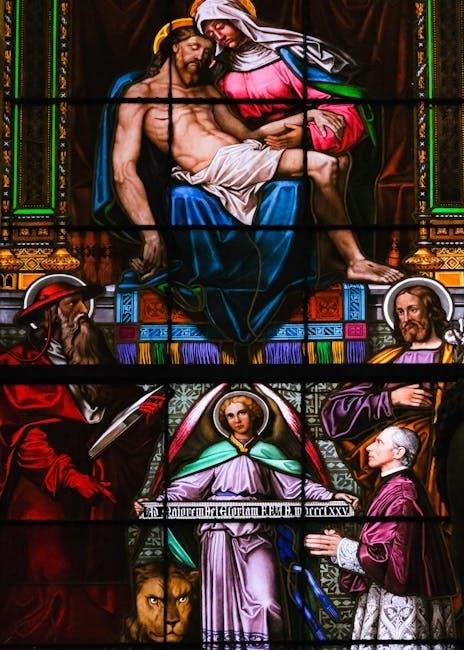
Character Analysis
The play delves into the complexities of four distinct personalities, revealing their flaws and virtues as civility erodes. Each character’s primal instincts and true selves emerge, exposing societal masks and raw human emotion.
Veronique Houllié
Veronique Houllié is one of the central characters in God of Carnage, initially presenting herself as the most benevolent and harmonious of the group. A writer focused on global atrocities, such as those in Darfur, she appears idealistic and empathetic. However, her facade crumbles as the play progresses, revealing her judgmental and controlling nature. Veronique’s desire for civility clashes with her inability to tolerate others’ flaws, particularly those of Annette and Alain Reille. Her actions and dialogue expose a deep-seated hypocrisy, as she condemns others while struggling to maintain her own moral high ground; Despite her efforts to uphold decorum, Veronique’s true, primal self emerges, highlighting the societal masks individuals wear and the fragility of human composure.
Michel Houllié
Michel Houllié, Veronique’s husband, initially appears as a peacemaker, offering hospitality to the Reilles. However, his true nature emerges as the conversation progresses. Michel reveals his uncouth side, making racial slurs and expressing disdain for child-raising. His controversial actions, such as releasing his daughter’s hamster due to his fear of rodents, shock the other adults. This incident, which occurs before the play, showcases his selfishness and lack of empathy. By the end, Michel’s daughter calls, distraught over her lost pet, further highlighting his flawed character. His transformation from a seemingly civil man to someone with questionable morals underscores the play’s theme of societal facades crumbling, revealing primal instincts and true selves.
Annette Reille
Annette Reille, Ferdinand’s mother, is a complex character teetering on the edge of emotional instability. She begins the meeting with Veronique and Michel Houllié hoping for resolution, believing communication can mend the situation. However, her fragile confidence and feelings of abandonment by her husband, Alain, who is preoccupied with work, soon surface. Annette’s frustration escalates, leading to her vomiting twice during the play, a physical manifestation of her inner turmoil. She also becomes the most physically destructive, smashing a vase and ruining Alain’s phone. Despite her emotional struggles, Annette defends Ferdinand, justifying his actions as a response to provocation. Her breakdown reveals the cracks in her marriage and the societal pressures she faces, adding depth to the play’s exploration of human nature and relationships.
Alain Reille
Alain Reille, Ferdinand’s father, is a self-centered and dismissive lawyer deeply invested in his career. His constant phone use during the meeting highlights his priorities, as he often interrupts discussions to attend to work matters. Representing a pharmaceutical company facing a lawsuit, Alain is pragmatic and cynical, questioning the value of compassion and suggesting humans act primarily out of self-interest. He is openly rude, interrupting others and expressing sexist views, which alienates him further from the group. Despite his brash exterior, Alain is the most honest character, voicing uncomfortable truths about human nature. His dismissive attitude toward his son’s behavior and refusal to take responsibility escalate tensions, making him a catalyst for the evening’s chaos and conflict.
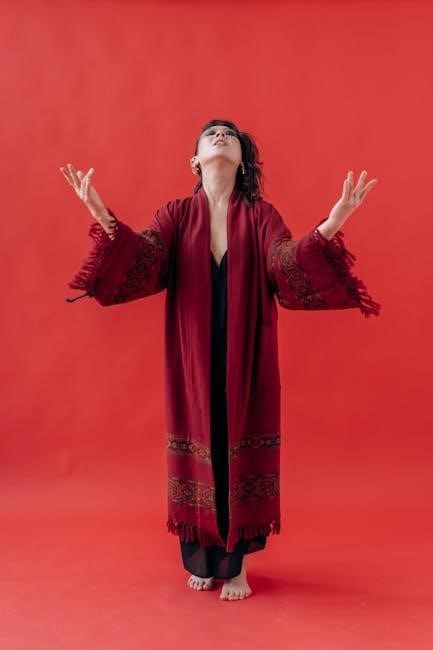
Symbolism and Setting
The living room symbolizes civilization’s facade, while the playground incident represents underlying societal tensions. Alcohol acts as a catalyst, unraveling the characters’ inhibitions and revealing their true nature.
The Living Room as a Symbol of Civilization
The living room in God of Carnage serves as a symbol of civilization, representing the thin veneer of societal norms and etiquette. The meticulously designed space, filled with refined decor, initially reflects the characters’ attempts to maintain decorum. However, as tensions rise, the room’s tranquility is disrupted, mirroring the breakdown of their civilized facade. The setting traps the characters in a confined environment, accelerating their descent into primal behavior. Through this setting, Reza critiques the superficiality of modern society, suggesting that beneath the polished exterior lies a cauldron of raw emotions and primal instincts. The living room thus becomes a microcosm of civilization’s fragility.
The Significance of the Playground Incident
The playground incident in God of Carnage serves as the catalyst for the events, symbolizing the breakdown of civility and the emergence of primal instincts. Ferdinand’s attack on Bruno, knocking out two teeth, sets the stage for a meeting between their parents. Initially, the incident appears trivial, but it escalates into a reflection of the adults’ underlying tensions and societal hypocrisies. The confrontation reveals how quickly civility crumbles when personal interests and egos are threatened. Through this incident, Reza highlights the fragility of human decorum and the ease with which individuals revert to their baser selves. The playground altercation becomes a metaphor for the inherent savagery lurking beneath the surface of polite society, driving the play’s exploration of human nature and societal expectations.
Alcohol as a Catalyst for Conflict
Alcohol plays a pivotal role in God of Carnage, acting as a catalyst that accelerates the deterioration of civility and heightens tensions among the characters. As the parents consume wine during their meeting, their inhibitions gradually fade, revealing their true selves. The alcohol loosens their tongues, leading to harsher exchanges and the exposure of their underlying flaws and biases. Veronique’s controlled demeanor begins to crack, Michel’s crude remarks surface, Annette’s insecurities boil over, and Alain’s arrogance becomes more pronounced. Through this subtle yet powerful element, Reza illustrates how alcohol can strip away social facades, exposing the raw emotions and primal instincts that lie beneath. This serves as a commentary on the fragility of human self-control and the ease with which societal norms can be abandoned.
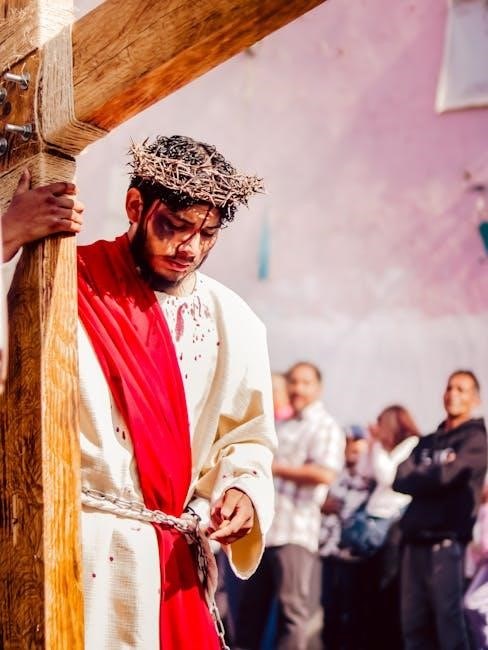
Reception and Impact
God of Carnage has been critically acclaimed, winning numerous awards and sparking fierce debates. Its unflinching portrayal of human nature left audiences divided, yet deeply reflective, cementing its cultural significance.
Critical Acclaim and Awards
God of Carnage received widespread critical acclaim for its biting dialogue and profound exploration of human nature. The play won the Laurence Olivier Award for Best New Play in 2009 and the Tony Award for Best Play in 2009. Critics praised Yasmina Reza’s ability to strip away societal facades, revealing raw emotions and primal instincts. The play’s sharp wit and intense character dynamics were highlighted as masterful. Its success led to international productions, solidifying its reputation as a modern classic. Audiences and critics alike were captivated by its unflinching portrayal of civility’s breakdown, making it a landmark in contemporary theater. The play’s awards and acclaim underscore its enduring impact on audiences worldwide.
Audience Response and Controversies
God of Carnage has sparked intense audience reactions, blending admiration for its boldness with discomfort at its raw honesty. Some viewers praise its unflinching portrayal of human frailty, while others find certain scenes, like Annette’s vomiting or Michel’s racial slurs, unsettling. The play’s dark humor and escalating tensions often leave audiences both captivated and uneasy. Controversies arise from its candid depiction of societal hypocrisies and primal instincts, challenging viewers to confront their own darker impulses. Despite this, the play’s ability to provoke thought and emotion has cemented its reputation as a fearless exploration of human nature, making it a subject of both acclaim and debate worldwide.
Comparison to Other Works by Yasmina Reza
Yasmina Reza’s God of Carnage mirrors the sharp wit and satirical edge seen in her earlier works like Art and The Unexpected Man. Similar to these plays, it delves into themes of human nature, societal pretenses, and interpersonal conflicts. Reza’s ability to craft dialogue that cuts through facades is consistent, as is her focus on the complexities of relationships; However, God of Carnage is unique in its intensity and relentless pace, pushing characters to their limits. While her other works often explore intellectual pretensions, this play strips away civility entirely, revealing primal instincts. It solidifies Reza’s reputation for unflinching examinations of human behavior, making God of Carnage a standout piece in her repertoire.
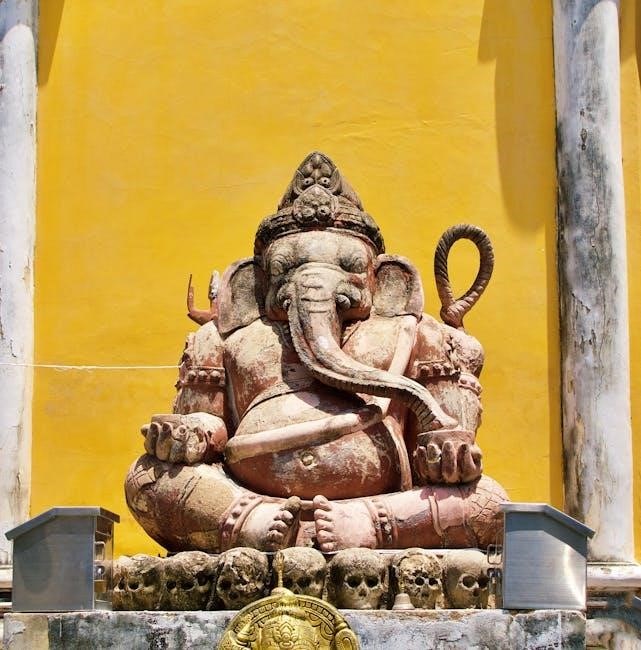
Adaptations and Performances
God of Carnage was adapted into a film, Carnage, directed by Roman Polanski, featuring Jodie Foster, Kate Winslet, Christoph Waltz, and John C. Reilly; The play has been staged worldwide.
Stage Productions Worldwide
God of Carnage has been widely acclaimed for its global stage productions, debuting in Zurich in 2006 and later in Paris, London, and New York. Directed by Jürgen Gosch and Yasmina Reza, the play captivated audiences with its sharp dialogue and intense character dynamics. Productions in cities worldwide, including Boston, London, and Sydney, showcased its universal appeal. The play’s setting, often confined to a single living room, emphasized the claustrophobic tension between characters. Performances were praised for their raw emotion and dark humor, with notable actors like Isabelle Huppert and Ralph Fiennes bringing the characters to life. Running approximately 90 minutes without intermission, the play maintained its gripping pace, leaving audiences reflecting on human nature’s complexities.
Movie Adaptation: “Carnage”
Directed by Roman Polanski, Carnage is the film adaptation of God of Carnage, featuring an ensemble cast including Jodie Foster, Kate Winslet, Christoph Waltz, and John C. Reilly. The movie retains the play’s core themes of civility’s breakdown and primal instincts, capturing the tension and chaos as two couples meet to discuss their sons’ altercation. The film premiered at the Venice Film Festival in 2011, receiving critical acclaim for its performances and faithful adaptation. Polanksi’s direction masterfully translates the play’s confined setting to the screen, maintaining the claustrophobic atmosphere and escalating conflict. The movie was praised for its sharp dialogue and the actors’ ability to portray the characters’ darker sides, making it a compelling adaptation of Reza’s original work.

Notable Actors and Their Performances
The stage productions of God of Carnage have featured remarkable performances from renowned actors. In the original Paris production, Isabelle Huppert and Fabrice Luchini delivered standout portrayals, bringing depth and nuance to Annette and Michel. On Broadway, Marcia Gay Harden and James Gandolfini captivated audiences with their intense performances, earning critical acclaim. In London’s West End, Tamsin Greig and Ralf Little also received praise for their dynamic portrayals of Veronique and Alain. Each actor masterfully conveyed the characters’ descent from civility to chaos, highlighting Reza’s sharp dialogue and the play’s emotional complexity. Their performances were instrumental in the play’s success, showcasing the versatility and power of the script across different productions worldwide.
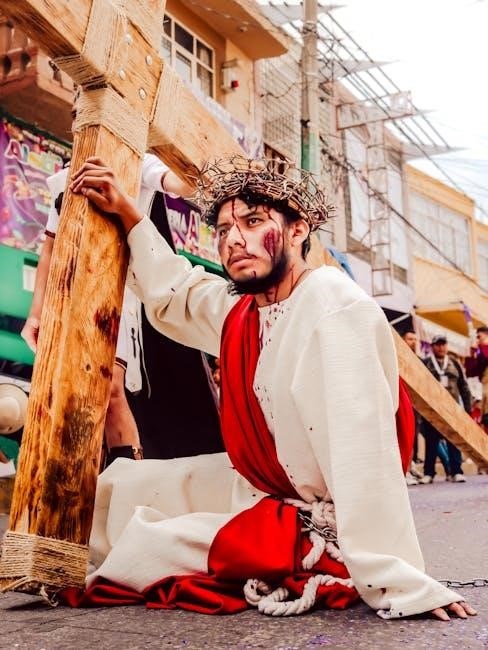
Study Guide and Educational Resources
A comprehensive study guide for God of Carnage includes a detailed plot summary, character analysis, and discussion topics, aiding students in understanding the play’s themes and complex characters.
Plot Summary and Analysis
God of Carnage revolves around a meeting between two couples, Véronique and Michel Houllié, and Annette and Alain Reille, to discuss a playground altercation involving their sons. Initially civil, the conversation escalates into chaos, revealing primal instincts and societal hypocrisies. The play explores themes like civility’s fragility and human nature’s darker side, highlighting how quickly adults abandon decorum. Through sharp dialogue and escalating tensions, Reza critiques societal norms and marital dynamics, exposing characters’ flaws and moral ambiguities. The analysis delves into how suppressed emotions and self-interest dominate interactions, leaving the audience to reflect on humanity’s duality and the thin line between order and chaos.
Character Development and Motivations
The characters in God of Carnage undergo significant development, revealing their true selves as civility crumbles. Véronique, initially poised and rational, becomes judgmental and controlling, driven by a desire to impose moral order. Michel, seemingly affable, exposes his crude and cynical side, motivated by a wish to avoid confrontation. Annette, fragile and emotionally volatile, seeks validation and relief from her strained marriage, while Alain, cynical and self-centered, prioritizes his career and dismisses moral accountability. Their interactions expose deep insecurities, betrayals, and primal instincts, highlighting how societal expectations mask their true natures. Each character’s flaws and virtues emerge, creating a complex exploration of human behavior and relationships.
Study Questions and Discussion Topics
Explore the themes of civility and savagery: How do the characters’ actions reflect their true nature? What societal expectations mask their primal instincts?
- Discuss the role of marriage and relationships: How do the couples’ interactions reveal underlying tensions and betrayals?
- Analyze the symbolism of the living room: How does the setting represent civilization’s facade?
- Examine the impact of alcohol: How does it serve as a catalyst for conflict and truth revelation?
- Reflect on human nature: What does the play suggest about people’s ability to suppress or embrace their darker instincts?
- Consider the playwright’s intent: What message does Yasmina Reza convey about modern society and its hypocrisies?
- What evidence from the text supports the idea that civility is merely a surface-level construct?
- How do the characters’ motivations shift as the play progresses? What triggers these changes?
- What role does class and status play in shaping the characters’ behaviors and attitudes?
- How does the play’s resolution (or lack thereof) leave the audience thinking about human relationships?
These questions encourage a deeper understanding of the play’s complexities and its commentary on human behavior.
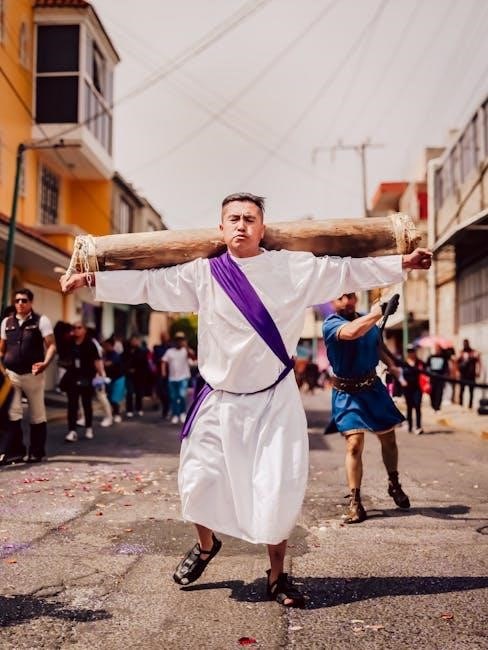
Historical and Cultural Context
Set in contemporary France, God of Carnage reflects societal norms and class dynamics, offering a critique of urban elitism. Its universal themes of human conflict resonate globally, adapting across cultures.
Societal Norms in Contemporary France
In God of Carnage, Yasmina Reza critiques the societal norms of modern France, particularly the urban elite’s pretense of civility. The play portrays how these norms crumble under stress, revealing primal instincts and hypocrisy. The characters’ behaviors reflect the tension between maintaining a polished facade and succumbing to raw emotions. Reza’s exploration highlights the superficiality of societal expectations and the underlying savagery that exists beneath them. This critique resonates with audiences, offering a mirror to the fragility of civilized behavior in contemporary society.
The Role of Class and Status in the Play
God of Carnage delves into the influence of class and status on the characters’ interactions. The affluent couples’ polished exteriors mask their true selves, revealing how societal standing shapes their behaviors. Veronique’s humanitarian efforts and Annette’s fragile composure reflect their adherence to upper-class norms. Michel’s crudeness and Alain’s detachment from emotional responsibilities underscore the hypocrisy often associated with privilege. The play critiques how class dictates moral judgment and interaction, exposing the superficiality of their refined lifestyles. Through their unraveling, Reza highlights the tension between maintaining social status and confronting primal instincts, offering a scathing critique of class-driven pretense. This dynamic drives the conflict, illustrating how deeply ingrained social hierarchies affect human behavior.
Cultural Differences in International Productions
International productions of God of Carnage reveal cultural differences in audience reception and interpretation. While the core themes remain consistent, adaptations in different countries reflect local sensibilities. For instance, French audiences may resonate more with the nuances of bourgeois hypocrisy, whereas American productions often emphasize the humor and absurdity of the characters’ collapse. Cultural variations also influence character portrayals, with actors adapting dialogue and mannerisms to fit regional norms. Despite these differences, the play’s universal exploration of human nature ensures its relevance across cultures. Such adaptability highlights Reza’s ability to craft a story that transcends borders, making God of Carnage a globally resonant commentary on societal norms and individual behavior.
God of Carnage masterfully exposes human frailty, revealing how societal masks crumble under stress. Yasmina Reza’s biting satire leaves audiences pondering civility’s fragility and primal instincts’ enduring power.
Legacy of “God of Carnage”
God of Carnage has left an indelible mark on modern theatre, celebrated for its biting dialogue and unflinching portrayal of human nature. Its exploration of civility’s breakdown and primal instincts resonates universally, making it a timeless commentary on societal norms. The play’s success has inspired numerous productions worldwide, solidifying Yasmina Reza’s reputation as a master playwright. Its themes continue to provoke thought, ensuring its relevance in contemporary discourse. The play’s ability to mirror real-life conflicts has made it a favorite among audiences and scholars alike, cementing its legacy as a powerful critique of modern society.
Final Thoughts on the Play’s Significance
God of Carnage stands as a profound commentary on human behavior, masterfully exposing the fragility of civility and the primal instincts lurking beneath. Its sharp dialogue and relentless pacing captivate audiences, forcing them to confront uncomfortable truths about themselves. The play’s universal themes of marriage, parenthood, and societal hypocrisy resonate across cultures, making it a timeless work. By stripping away the masks of politeness, Reza reveals the raw, often ugly, reality of human interaction. This unflinching honesty has cemented the play’s legacy as a modern classic, leaving viewers to ponder the duality of their own nature long after the curtain falls. Its impact continues to grow, ensuring its relevance for years to come.
